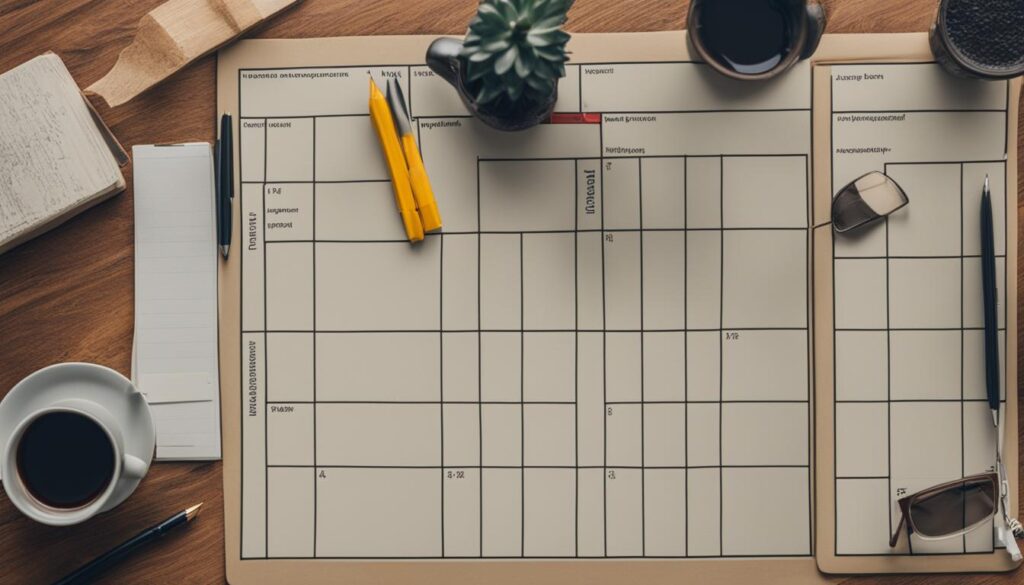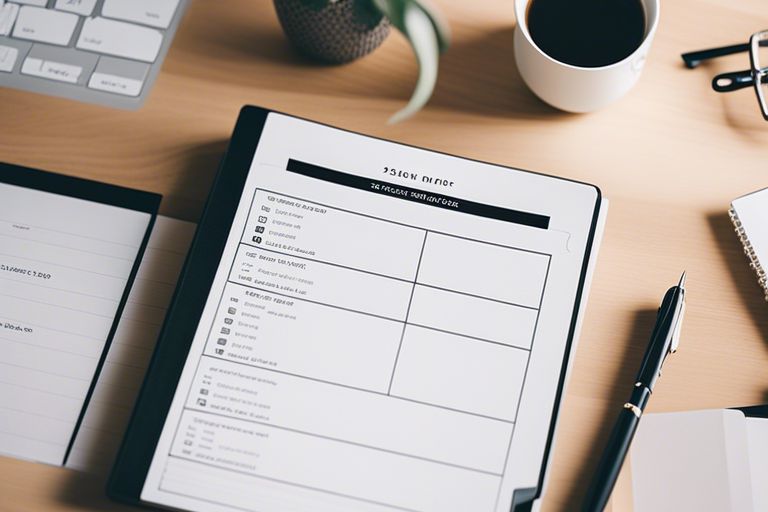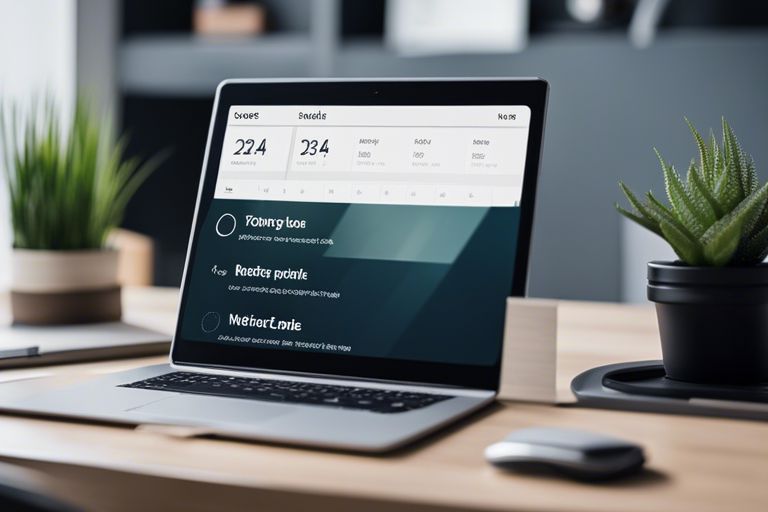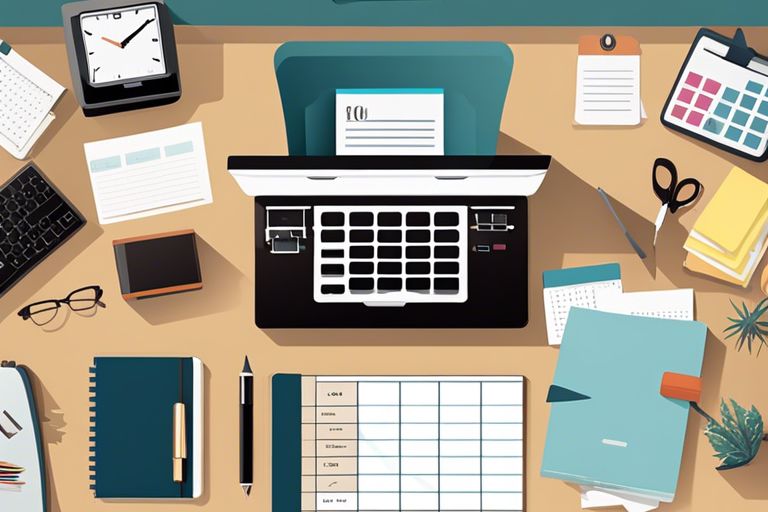Are you struggling to keep up with your daily work schedule? Is your productivity suffering as a result? Effective time management is the key to managing your time effectively and maximizing your productivity. In this article, we will provide you with valuable time management tips that will help you prioritize tasks, create a daily schedule, and ultimately take control of your workday.
Time management is essential for staying on top of your workload and ensuring that important tasks are completed in a timely manner. By organizing your day and implementing effective time management strategies, you can make the most of your time and achieve your goals.
So, if you’re ready to take charge of your daily work schedule and boost your productivity, continue reading for valuable insights and actionable tips on how to manage your time effectively. Let’s dive in!
Know How You’re Spending Your Time
In order to optimize productivity and effectively manage your time, it is crucial to have a clear understanding of how you are spending your time. By knowing where your time is going, you can identify areas of improvement and make necessary adjustments to your daily work schedule.
One effective way to track and analyze your activities throughout the day is by using time-tracking tools. Tools like RescueTime can help you monitor the time you spend on various tasks and provide detailed insights into your productivity. By using these tools, you can easily identify time-wasting activities and non-work-related distractions that may be hindering your productivity. This awareness allows you to make conscious decisions and prioritize tasks more effectively.
To ensure that your schedule remains intact even if one task goes over the time limit, it is important to incorporate time buffers between tasks. Time buffers act as a cushion and provide flexibility in your daily work schedule. If a task takes longer than anticipated, you have some extra time built-in to avoid feeling stressed or overwhelmed. By strategically allocating time buffers, you can maintain a sense of control over your schedule and avoid unnecessary pressure.
Utilizing Time-Tracking Tools
Time-tracking tools like RescueTime play a vital role in helping you understand and manage your time effectively. By tracking the time you spend on various activities, these tools provide valuable insights into your productivity and help you identify areas for improvement. With this information, you can make informed decisions, set realistic goals, and prioritize tasks based on their importance and urgency.
Additionally, time-tracking tools offer features that allow you to set alerts and reminders, helping you stay on track and focused on your tasks. Some tools even provide reports and analytics, giving you a comprehensive overview of your time allocation and productivity trends.

Integrating time-tracking tools into your daily work routine can significantly improve your time management skills and boost your overall productivity. By utilizing these tools, you can gain insights into your time usage patterns, optimize your work schedule, and make the most out of every minute of your day.
Prioritize and Tackle Tasks
To avoid feeling overwhelmed by a long list of tasks, it’s essential to prioritize them based on their importance and urgency. One effective method for prioritizing tasks is by using the Eisenhower Matrix, a decision-making matrix that categorizes tasks into four quadrants: important and urgent, important but not urgent, urgent but not important, and not important or urgent. This framework helps you identify which tasks require immediate attention and which can be scheduled for later, delegated, or eliminated altogether.
Creating a to-do list is a helpful way to keep track of your tasks and prioritize them accordingly. Begin by listing all the tasks you need to complete, and then organize them based on their level of importance and urgency. By focusing on the important and urgent tasks, you ensure that critical responsibilities are addressed in a timely manner.
To further enhance your productivity, consider delegating tasks that can be done by others. Delegation not only reduces your workload but also allows you to focus on more important tasks that require your expertise. Identify tasks that can be assigned to team members or colleagues who are capable of completing them efficiently.
Using the Eisenhower Matrix to Prioritize Tasks
The Eisenhower Matrix is a simple yet powerful tool for prioritizing tasks. Here’s how it works:
- Important and Urgent: These tasks should be done immediately. They are crucial and require your immediate attention and action.
- Important but Not Urgent: These tasks are important but can be scheduled for later. Set aside specific time slots to work on them when you have completed urgent tasks.
- Urgent but Not Important: These tasks may seem urgent, but they don’t contribute significantly to your goals or objectives. Delegate them to someone else if possible.
- Not Important or Urgent: These tasks are neither important nor urgent. Eliminate them from your to-do list or allocate them to times when you have completed more critical tasks.
By using the Eisenhower Matrix and having a clear understanding of the importance and urgency of your tasks, you can effectively prioritize and tackle them, leading to increased productivity and better time management.

Time Management Techniques
When it comes to managing your time effectively, implementing various time management techniques can make a significant difference in your productivity. These techniques can help you stay organized, prioritize tasks, and maintain focus throughout the day. By incorporating strategies such as the “Eat That Frog” method, batch processing, setting time limits, saying no, avoiding multitasking, organizing your workspace, and utilizing time management tools, you can optimize your daily work schedule and achieve better results.
The “Eat That Frog” Method
Popularized by Brian Tracy, the “Eat That Frog” method suggests tackling the most challenging task first to avoid procrastination. By starting your day with the most difficult task, you’ll build momentum and feel a sense of accomplishment, making it easier to tackle the rest of your to-do list.
Batch Processing
Batch processing involves grouping similar tasks together and completing them in one designated time frame. This technique eliminates the need to switch between different types of tasks, allowing you to work more efficiently and save time. For example, you can dedicate a specific time slot for replying to emails or making phone calls, rather than interrupting other important tasks throughout the day.
Setting Time Limits
Assigning specific time limits to each task can help you stay focused and prevent tasks from expanding to fill available time. By setting realistic deadlines, you create a sense of urgency and avoid wasting time on unnecessary details. Stick to the allocated time, and you’ll find that you complete tasks more efficiently.
Saying No and Avoiding Multitasking
Learning to say no to non-essential tasks or requests that don’t align with your priorities is essential for effective time management. Multitasking can lead to decreased productivity and lower quality of work. Instead, focus on one task at a time, giving it your full attention and ensuring it is completed before moving on to the next.
Organizing Your Workspace
A cluttered workspace can be distracting and impede productivity. Take the time to organize your physical and digital workspace, keeping essential tools and documents within reach and removing any unnecessary items. A clean and organized workspace helps create a conducive environment for concentration and efficiency.
Utilizing Time Management Tools
There are numerous time management tools available that can help streamline your workflow and increase productivity. Tools like project management platforms, task management apps, calendar apps, and communication tools can assist in managing your tasks, deadlines, and collaborations effectively.

FAQ
Q: What are some time management skills I should focus on?
A: It’s important to focus on skills such as setting a schedule, prioritizing tasks, avoiding procrastination, and delegating when necessary.
Q: How can I create a daily schedule to better manage my time?
A: You can use a daily planner or a digital calendar to block out time for different tasks and activities throughout the day.
Q: Why is it important to manage your time effectively?
A: Effective time management can lead to increased productivity, reduced stress, and a better work-life balance.
Q: What are some time management tips for work?
A: Some tips include planning your day the night before, tackling similar tasks together, and using time management software to track your progress.
Q: How can I better work smarter and use my time wisely?
A: You can achieve this by prioritizing tasks, setting specific goals, and eliminating distractions to focus on important work.
Q: How can I ensure that my daily tasks are done on time?
A: You can do this by practicing good time management, setting realistic deadlines, and breaking down tasks into manageable steps.
Q: What is the best way to manage personal time alongside work responsibilities?
A: It’s important to schedule specific time for personal activities and to avoid bringing work into that time as much as possible.
Q: What are some time management best practices I should follow?
A: Some best practices include setting aside time for focused work, taking regular breaks, and adjusting your schedule based on your energy levels.
Q: How can I practice good time management to get work done in less time?
A: You can practice good time management by breaking tasks into smaller steps, using time-saving tools, and learning to say no to non-essential tasks.
Q: What are the key principles of time management I should be aware of?
A: Some key principles include prioritizing tasks, focusing on one task at a time, and re-evaluating and adjusting your schedule as needed.
Conclusion
Effective time management is essential for maximizing productivity and achieving a healthy work-life balance. By implementing strategies such as tracking and analyzing how you spend your time, prioritizing tasks, utilizing time management techniques, and leveraging time management tools, you can better manage your daily work schedule.
Creating a daily schedule and prioritizing tasks based on importance and urgency allows you to focus on critical responsibilities in a timely manner. Eliminating distractions and staying organized increases efficiency and helps you make the most of your time. Remember to utilize time management techniques like the “Eat That Frog” method to tackle challenging tasks first and batch processing to efficiently complete similar tasks.
By incorporating effective time management practices into your routine, you can increase productivity, reduce stress, and maintain a better work-life balance. Finding the right strategies and tools for your specific needs will empower you to take control of your time and achieve your goals. Start implementing these techniques today to unlock your full potential and optimize your daily work schedule.
Take charge of your time, and see the positive impact it has on your productivity, well-being, and overall success. Effective time management is the key to a fulfilling and accomplished work life.








